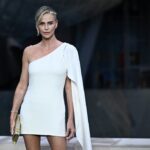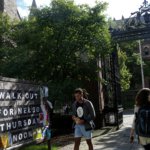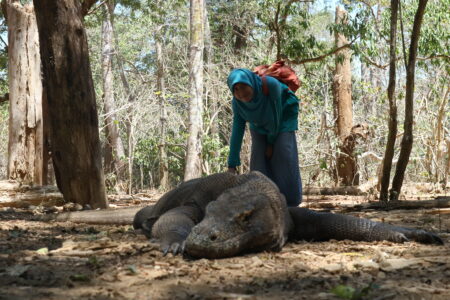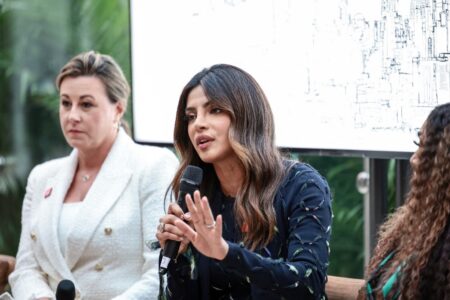
Ever seen a Javan Rhino in the wild? How about an Amur Leopard? Chances are, you haven’t — and you probably never will.
Brigitta Maria Andrea Gunawan, a conservation science student and National Geographic Young Explorer from Indonesia, wants to change that.
She refuses to stand by as nature disappears, even when she’s confronted with disheartening stats. Many of them.
Environmental science research by MarineBio Conservation Society finds that 42,100 species are threatened with extinction in the coming decades. And that is only 28% of assessed species.
The biggest reason? Humans. The IPBES Global Assessment Report on Biodiversity and Ecosystem Services reports that human activities like pollution, deforestation, and reckless development have already damaged 75% of land and 40% of our ocean, leaving little room for wildlife to survive.
But there’s hope. To date, 21 countries have ratified and hundreds have signed the High Seas Treaty, an international agreement under the UN Convention on the Law of the Sea (UNCLOS), which is a significant step towards protecting 30% of the ocean by 2030.
Gunawan plans to be on this side of history: the one that’ll save the planet.
View this post on Instagram
17 and fighting for the ocean
Gunawan has always loved the outdoors, especially the ocean. But she had never considered marine conservation as a career; not because she wasn’t interested, but because she didn’t know it was an option.
That changed in high school, when she visited her first marine protected area and started learning about the threats marine ecosystems face.
“I realised that this is something I’m passionate about, especially with Indonesia being at the heart of the Coral Triangle,” she says. “There’s so much to explore, so much to protect. And once you realise that, you can’t just look away.”
In 2021, at just 17, Gunawan joined her first fellowship, the OceanEcho 30×30 Fellowship and founded 30×30 Indonesia. The initiative advances the global 30×30 goal and Indonesia’s 30×45 vision by engaging communities in education, policy advocacy, and habitat restoration efforts.
“My strategy was to launch a picture campaign, and within a month, we gathered over 400 images,” she says. “As a high school student still learning how to navigate advocacy, that felt like a huge achievement.”
Then, as COVID-19 restrictions eased, Gunawan and her team shifted their focus to local communities, building connections and expanding their reach.
“Our most recent advocacy campaign was for the High Seas Treaty,” she says. “We have gathered over 15,600 signatures since December 2024.”

Gunawan in one of Monash Clayton’s science labs. Source: Brigitta Maria Andrea Gunawan
Applying for a conservation science degree
Amidst her advocacy work, Gunawan achieved another personal victory: she secured a fully funded scholarship to study at Monash University in Australia.
“I always dreamed of studying abroad, but I knew that meant finding a full scholarship,” she says.
She came across an Instagram ad for Monash’s fully funded scholarship programme. With few undergraduate scholarships aligning with her interests, she knew she had to apply.
Conservation science combines multiple scientific disciplines to address today’s most pressing ecological challenges. Examples include marine biology, climate change, energy, and pollution prevention.
Gunawan, for example, pursued a Bachelor of Science with an extended major in Ecology and Conservation Biology and a minor in Earth Science.
View this post on Instagram
What it’s like to study conservation science
At Monash, she spent a lot of time outdoors, exploring Victoria’s ecosystems. Among her most memorable fieldwork experiences was a trip to the rocky shores, where she identified various algae and marine organisms along a transect. Another involved mapping beaches.
Closer to campus, she often conducted research at the Jock Marshall Reserve (JMR), a research site just five minutes from campus. Many of her second-year labs took place there, and she recalls an impromptu boat experiment on the campus lake.
“It was a random Monday morning, and they were calling for volunteers to board a small boat and collect samples from the water,” she says. “At that time, I didn’t even know the university had a lake, let alone a boat.”
As a competitive swimmer, she figured, why not? “It’s one of those things that stick with you because it was so unexpected,” she says.
But fieldwork was only part of the equation. As she continued her BSc, Gunawan remained focused on driving real change.

Peter Thomson, the United Nations Secretary-General’s Special Envoy for the Ocean, and Gunawan at the Global Citizen NOW Summit in Melbourne. Source: Lawrence Furzey
A movement that keeps growing
What began as a two- to three-month 30×30 Ocean Echo Fellowship and the launch of 30×30 Indonesia soon became much bigger. “I guess I could call it my hobby,” she says. “When you love what you do, it doesn’t feel like work.”
Gunawan was applying for mentorship programmes, leadership training, and seed funding initiatives left and right. Over time, she gained support from organisations like the National Geographic Society and The Nature Conservancy.
“We focused on how Sustainable Development Goal (SDG) 14 connects with other SDGs,” she says. “We’ve organised student-led mangrove planting efforts and even established a coral restoration site in Northeast Bali. It’s still going strong today, managed entirely by volunteers.”

Gunawan at the United Nations Ocean Conference. Source: Kiara Worth
An introvert with nerves of steel
If you had told Gunawan years ago that she’d be addressing world leaders at international conferences, she wouldn’t have believed you. An introvert at heart, she once shied away from speaking in public.
Yet, at the United Nations Ocean Conference, she found herself doing just that. With only 24 hours’ notice, she was asked to deliver a pre-approved speech.
The nerves were already setting in, but then came an even bigger surprise. “I didn’t expect the actual president of Portugal to be the one introducing me and the other delegates,” she says.
Another unforgettable experience came at the Global Citizen event in Melbourne. As a Global Citizen Youth Leader awardee, she was invited to join a fireside chat with Peter Thomson, the UN Ambassador for the Ocean.
“We had a prompt, but we went off script,” she shares. ” That’s what made it special, I got to have a real discussion with someone I’ve long admired.”
But perhaps the most unexpected moment of all came from her interactions with Sarah Ferguson, Duchess of York.
“I didn’t know I’d be the last speaker. And then, suddenly, she called my name,” she recalls. “And instead of leaving the stage, she stayed and gave me a hug in front of everyone.” It wasn’t rehearsed, it wasn’t planned.
With each opportunity, she found herself growing and getting more confident. “I still get nervous, but nerves are good,” she says. “Now that I have had exposure with a variety of audiences, I know what to expect and how to tailor my speeches accordingly.”
Of course, that’s not to say her journey was without challenges. “I was 17 when I started and often the youngest in the room. There were also moments when people dismissed my ideas simply because of my age,” she says.
“Over time, I discovered that many people genuinely want to support young voices. Some of the most incredible allies I’ve met, including members of my own team, want to ensure we don’t make the same mistakes they did.”
As for what’s next? She’s keeping her options open but remains committed to her love for the ocean. She plans to complete her honours at Monash and may pursue a research career, or even a PhD, after that.










